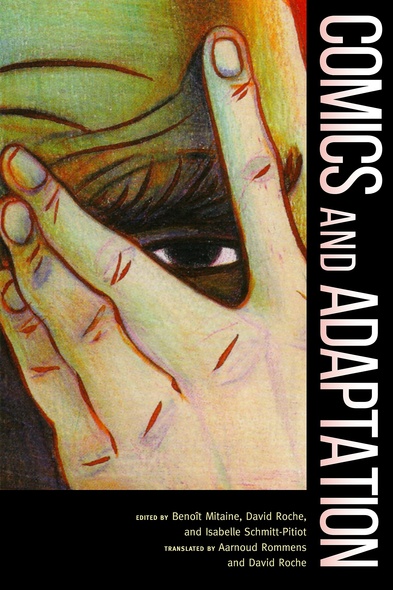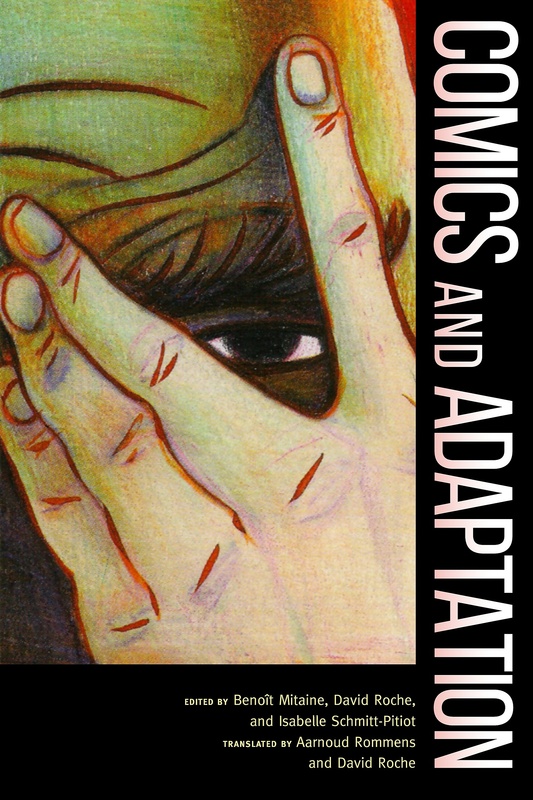
Comics and Adaptation
Contributions by Jan Baetens, Alain Boillat, Philippe Bourdier, Laura Cecilia Caraballo, Thomas Faye, Pierre Floquet, Jean-Paul Gabilliet, Christophe Gelly, Nicolas Labarre, Benoît Mitaine, David Roche, Isabelle Schmitt-Pitiot, Dick Tomasovic, and Shannon Wells-Lassagne
Both comics studies and adaptation studies have grown separately over the past twenty years. Yet there are few in-depth studies of comic books and adaptations together. Available for the first time in English, this collection pores over the phenomenon of comic books and adaptation, sifting through comics as both sources and results of adaptation. Essays shed light on the many ways adaptation studies inform research on comic books and content adapted from them. Contributors concentrate on fidelity to the source materials, comparative analysis, forms of media, adaptation and myth, adaptation and intertextuality, as well as adaptation and ideology.
After an introduction that assesses adaptation studies as a framework, the book examines comics adaptations of literary texts as more than just illustrations of their sources. Essayists then focus on adaptations of comics, often from a transmedia perspective. Case studies analyze both famous and lesser-known American, Belgian, French, Italian, and Spanish comics.
Essays investigate specific works, such as Robert Louis Stevenson’s The Strange Case of Dr. Jekyll and Mr. Hyde, the Castilian epic poem Poema de Mio Cid, Ray Bradbury’s Martian Chronicles, French comics artist Jacques Tardi’s adaptation 120, rue de la Gare, and Frank Miller’s Sin City. In addition to Marvel Comics’ blockbusters, topics include various uses of adaptation, comic book adaptations of literary texts, narrative deconstruction of performance and comic book art, and many more.
A timely and useful collection which challenges some of the presuppositions of adaptation studies. . . . Comics and Adaptation is a welcome addition to the work on both comics and adaptation and is valuable reading for scholars in either area.
The edited volume considerably furthers research on this topic through its able blending of theoretical meditations, analyses, and case studies. . . . [It] succeeds in encouraging research on the topic (and perhaps even the existence of adaptation) through the way it convinces readers to approach adaptation and specifically comics and adaptation with an open mind, to see the creative opportunities.
The editors’ theoretically broad introduction to Comics and Adaptation does not augur well for typical fan com readers, but in elevating comics beyond mere illustration it does set up the framework for the scholarly essays that engage how adaptations of comic and graphic novels transcend their literary sources. The editors cogently argue for the legitimacy of studying comics through the filter of adaptation studies. The international coterie of academic contributors they have gathered explore pertinent concepts from polyphony, hypertextuality, orality, shattering figuration, transposition, and dissolution of forms to captions and speech balloons in contrasting the sources and extensions of graphic comics. Among the works treated are 120, rue de la Gare, Sin City, Watchmen, and Fritz the Cat. The volume is divided into two parts: the first examines adaptation from the page to the panel, and the second explores it from the panel to the screen and back again, with vividly illustrated, framed images. In particular, Mitaine’s essay on the adaptation of Guy de Maupassant’s classic short story ‘Le Horla’ stands as an exemplar of these fascinating studies, all of them translated into lucid English for the benefit of Anglophone readers.
Comics and Adaptation is one of the rare books that provides a useful tool set to approach and understand this particular creative moment. Hopefully, the ultimate outcome of this text will be a revived and more focused approach to comics adaptations of all stripes that befits their undeniable cultural relevance.
Benoît Mitaine is associate professor of Spanish at the Paul Valéry University of Montpellier. He is coeditor of Lignes de front: bande dessinée totalitarisme and Autobio-graphismes: bande dessinée et représentation de soi. David Roche is professor of film studies at the Paul Valéry University of Montpellier. He is author of Making and Remaking Horror in the 1970s and 2000s: Why Don’t They Do It Like They Used To? and Quentin Tarantino: Poetics and Politics of Cinematic Metafiction and editor of Conversations with Russell Banks, all published by University Press of Mississippi. Isabelle Schmitt-Pitiot is retired associate professor of English at the Université de Bourgogne, Dijon, France. She has coedited Intimacy in Cinema: Critical Essays on English-Language Films and published widely on English-language cinema. Aarnoud Rommens is an independent scholar, editor, and translator. He is author of Joaquín Torres-García: Constructive Universalism and the Inversion of Abstraction and editor of Comics and Abstraction: Narrative by Other Means.





